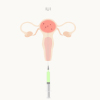Fertility Specialist In Chennai
Book your appointment with the best fertility specialist in Chennai at Pristyn Care for advanced fertility services like IVF, male and female infertility treatments, IUI, egg-freezing, etc. Our experienced fertility specialists leverage cutting-edge technology to maximize your chances of getting pregnant. Contact us now to discuss your fertility concerns with our experts.
Book FREE Consultation
Our Specialities


Surrogacy is the arrangement of a surrogate mot...

Egg freezing is a procedure to harvest a woman&...


Intrauterine Insemination (IUI) or artificial i...

Any health condition in a man that lowers his c...

IVF is a reproductive treatment where a female ...
Best Doctors for Fertility in Chennai
Blogs
Frequently Asked Questions
To schedule an appointment with Pristyn Care’s fertility specialist in Chennai, call us directly or fill out the appointment form. Our representatives will contact you and schedule an appointment for you.
The consultation fee of Pristyn Care’s fertility specialist in Chennai can vary depending on different factors, such as the specialist’s experience, the complexity of the medical condition, and additional procedures performed during the consultation, such as diagnostic tests. Generally, the consultation fee ranges from Rs. 500 to Rs. 1000.
To choose the right fertility specialist in Chennai, consider factors like the doctor’s experience, success rates, patient reviews, and the clinic’s facilities. It’s important to have a consultation to discuss your specific case and understand the approach the specialist recommends.
The cost of fertility treatments in Chennai can range from Rs. 1,00,000 to Rs. 3,50,000. However, the cost can differ widely depending on various factors, including the type of treatment, the complexity of the case, diagnostic tests and consultations, the number of treatment cycles, assisted reproductive technologies (ART) procedures, etc. It’s important for individuals seeking fertility treatment to thoroughly research and understand the costs associated with the specific treatments they are considering, including any potential added costs.
Here are some questions to consider asking your fertility specialist:
- What specific tests will be conducted to diagnose the fertility issue?
- What fertility treatment options are available for my condition?
- What are the success rates for the suggested treatment?
- What are the potential risks and side effects associated with the recommended treatment?
- How many treatment cycles are generally needed for this specific treatment to be successful?
- What is the estimated cost of the treatment, including medicines?
- Does insurance cover any part of the fertility treatment?
- What type of follow-up and monitoring will be conducted during and after the treatment?
What Treatments Are Performed By A Fertility Specialist?
Here are some of the common treatments provided by fertility specialists:
Diagnostic testing
Fertility specialists often begin by conducting a comprehensive assessment to determine the underlying causes of infertility in both males and females
Female fertility treatments
Fertility specialists commonly perform a wide range of female fertility treatments. Some of these treatments include the following:
- Ovulation induction: If a woman is not ovulating regularly or not ovulating at all, fertility experts may prescribe medicines to stimulate ovulation. Medicines that may be prescribed include clomiphene citrate or gonadotropins.
- Intrauterine insemination (IUI): This treatment involves placing sperm straight into the uterus around the time of ovulation. This can be a viable treatment choice for couples with unexplained infertility or mild male factor infertility.
- In vitro fertilization (IVF): IVF is a more developed fertility treatment where eggs are recovered from the woman’s ovaries, fertilized with sperm in a laboratory setting, and then implanted into the uterus. IVF is often suggested by fertility specialists for various fertility problems, including tubal factor infertility, severe male factor infertility, endometriosis, and unexplained infertility.
- Egg freezing (oocyte cryopreservation): Fertility specialists may offer egg freezing to women who want to preserve their fertility for future use. This involves stimulating the ovaries, retrieving mature eggs, and freezing them for later usage.
Male fertility treatment
Male fertility treatments performed by fertility specialists include:
- Varicocele repair: Varicocele is the growth of veins within the scrotum, which can negatively affect sperm production and quality. Fertility specialists perform varicocele repair, which is a surgical procedure to ligate or seal off the dilated veins, thereby enhancing blood flow and potentially improving sperm parameters.
- Azoospermia treatment: Azoospermia is a medical condition in which the ejaculation does not hold any sperm in it, which can impede a male’s ability to impregnate a female. Several surgical procedures, including Testicular Sperm Extraction (TESE), are performed by fertility specialists to help treat this disorder and restore fertility.
- ICSI, or intracytoplasmic sperm injection: ICSI is an assisted reproductive technology (ART) procedure used as part of in vitro fertilization (IVF) to treat severe male infertility. This process involves directly injecting a single sperm into an egg to encourage fertilization. This approach was developed to address cases where traditional IVF may not be successful due to significant male factor infertility.
What Are The Qualifications Of A Fertility Specialist?
Here are the general qualifications and steps involved in becoming a fertility specialist:
- Medical degree: To become a fertility specialist, aspirants must obtain a bachelor’s degree with a strong focus on biological sciences and complete medical school to earn a doctor of medicine (MD) or doctor of osteopathic medicine (DO) degree.
- Residency training: Following medical school, aspiring fertility specialists must apply for and complete a residency program in obstetrics and gynecology. They need practical experience in prenatal care, childbirth, and general gynecological care.
- Fellowship: After completing residency, one must pursue additional specialization through a fellowship program focused on reproductive endocrinology and infertility. This fellowship generally lasts two to three years and delivers in-depth training in diagnosing and treating fertility issues. During this program, participants work closely with skilled and professional fertility experts to gain knowledge and experience in different aspects of reproductive medicine.
- Board certification: After completing the fellowship, you must obtain board certification in reproductive endocrinology and infertility. This involves passing rigorous exams that evaluate knowledge, skills, and adherence to ethical standards.
What Medical Conditions Do Fertility Specialists Treat?
Fertility specialists generally treat a variety of medical disorders and problems related to fertility. Some of the common conditions they address include:
- Infertility: Fertility experts are specialists in diagnosing and treating infertility. Infertility is defined as the inability to conceive after one year of regular unprotected intercourse.
- Polycystic ovary syndrome (PCOS): It is a hormonal medical condition that can impact ovulation and cause irregular menstrual cycles, ovarian cysts, and problems conceiving.
- Endometriosis: Endometriosis is a condition where tissue similar to the lining of the uterus develops outside the uterus, potentially causing several fertility issues.
- Male factor infertility: Conditions such as low sperm count, poor sperm motility, or abnormal sperm morphology can lead to male infertility.
- Ovulatory conditions: Conditions where a woman’s menstrual cycle is irregular or absent, making it difficult to predict when ovulation occurs, are also treated by fertility specialists.
- Recurrent pregnancy loss: Fertility specialists may examine and treat recurrent pregnancy loss to determine underlying causes and develop a treatment plan to enhance the chances of a successful pregnancy.
- Structural Abnormalities: Anomalies in the reproductive organs, such as uterine fibroids or polyps, can be addressed by fertility specialists.